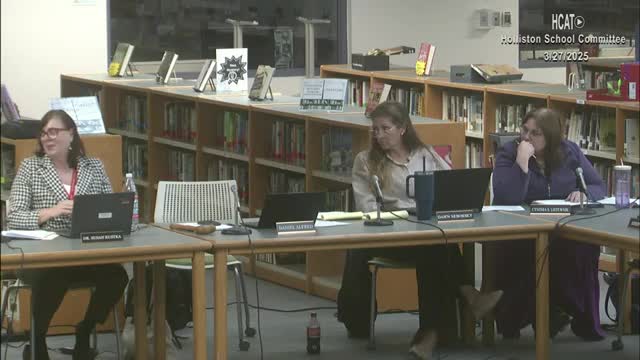School Committee clarifies eighth grade math structure amid de leveling concerns
March 29, 2025 | Holliston Public Schools, School Boards, Massachusetts
This article was created by AI summarizing key points discussed. AI makes mistakes, so for full details and context, please refer to the video of the full meeting. Please report any errors so we can fix them. Report an error »

During the recent Holliston Public Schools School Committee meeting held on March 27, 2025, discussions centered around the structure of eighth-grade math courses, addressing community concerns about potential changes to the leveling system.
The committee clarified that there are currently two levels in eighth-grade math, a system that has remained unchanged for over five years. A key point of contention was the perception that the school was moving towards "de-leveling" math courses. Committee members emphasized that while the higher-level eighth-grade math will transition to an Algebra 1 focus, there are no plans to eliminate levels entirely. This decision aligns with input received from the committee and a vote conducted the previous May.
One committee member shared personal insights, noting that their three children had varied experiences with math in the district, yet all had pathways to advanced calculus. This perspective aimed to reassure parents that despite changes in course structure, opportunities for advanced math remain intact. The member highlighted that different pathways could still lead students to calculus, emphasizing the goal of providing more opportunities rather than restricting them.
The meeting also indicated that further discussions on this topic would continue later in the agenda, suggesting that the committee is committed to addressing community feedback and ensuring clarity on the educational pathways available to students.
Overall, the meeting underscored the committee's intention to maintain a robust math curriculum while adapting to educational needs, aiming to foster an environment where all students can succeed in their mathematical education.
The committee clarified that there are currently two levels in eighth-grade math, a system that has remained unchanged for over five years. A key point of contention was the perception that the school was moving towards "de-leveling" math courses. Committee members emphasized that while the higher-level eighth-grade math will transition to an Algebra 1 focus, there are no plans to eliminate levels entirely. This decision aligns with input received from the committee and a vote conducted the previous May.
One committee member shared personal insights, noting that their three children had varied experiences with math in the district, yet all had pathways to advanced calculus. This perspective aimed to reassure parents that despite changes in course structure, opportunities for advanced math remain intact. The member highlighted that different pathways could still lead students to calculus, emphasizing the goal of providing more opportunities rather than restricting them.
The meeting also indicated that further discussions on this topic would continue later in the agenda, suggesting that the committee is committed to addressing community feedback and ensuring clarity on the educational pathways available to students.
Overall, the meeting underscored the committee's intention to maintain a robust math curriculum while adapting to educational needs, aiming to foster an environment where all students can succeed in their mathematical education.
View full meeting
This article is based on a recent meeting—watch the full video and explore the complete transcript for deeper insights into the discussion.
View full meeting
